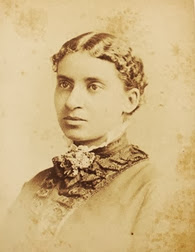Without doubt the most significant effect of the Civil War was the eventual emancipation of almost four million enslaved individuals who lived in the slaveholding states. Emancipation came sooner to some of those people than others.
On the sea islands off the coast of South Carolina a Union military force had landed and established a foothold there in the fall of 1861. And, while the slaveholders fled, the enslaved remained. An experiment of sorts in Reconstruction began in the spring of 1862, in which slaves were paid wages for their labor and had the ability to receive an education for the first time ever.
One of the first teachers to arrive at Port Royal was Charlotte Forten. Forten was born free in Philadelphia in 1837 to a wealthy family of color. Her grandfather, James Forten, had been a leading early black abolitionist. She received an education in Massachusetts and began her teaching career there. However, Forten's desire to be part of the significant changes occurring due to the war signed up to go teach the freed slaves on the coast of South Carolina.
Through triumphs, tragedies, and struggles Forten worked diligently to share the benefits of education with those who had never dreamed of reading and writing before the arrival of the Union army. Charlotte wisely kept a journal of her experiences with the former enslaved and from that primary source we have a much better understanding of this early attempt at Reconstruction. Life on the Sea Islands was published in 1864 in Atlantic Magazine. On January 1, 1864, Forten wrote of the first anniversary of the Emancipation Proclamation as it celebrated on the sea islands.
"New Year's Day - Emancipation Day - was a glorious one for us. The morning was quite cold, the coldest we had experienced; but we were determined to go to the celebration at Camp Saxton [named for Gen. Rufus Saxton], - the camp of the [African American] First Regiment South Carolina Volunteers, - whither the General and Colonel [Thomas Wentworth] Higginson had bidden us, on this, "the greatest day in the nation's history." We enjoyed perfectly the exciting scene on board the Flora. There was an eager, wondering crowd of the freed people in their holiday-attire, with the gayest of head-handkerchiefs, the whitest of aprons, and the happiest of faces. The band was playing, the flags streaming, everybody talking merrily and feeling strangely happy. The sun shone brightly, the very waves seemed to partake of the universal gayety, and danced and sparkled more joyously than ever before. . . .
The celebration took place in the beautiful grove of live-oaks adjoining the camp. It was the largest grove we had seen. I wish it were possible to describe fitly the scene which met our eyes as we sat upon the sand, and looked down on the crowd before us. There were the black soldiers in their blue coats and scarlet pantaloons, the officers of this and other regiments in their handsome uniforms, and crowds of lookers-on, - men, women, and children, of every complexion, grouped in various attitudes under the moss-hung trees. The faces of all wore a happy, interested look. . . .
Our hearts were filled with an exceeding great gladness; for, although the Government had left much undone, we knew that Freedom was surely born in our land that day. It seemed too glorious a good to realize, - this beginning of the great work we had so longed and prayed for."
Later in 1864, while still on the South Carolina coast Charlotte Forten grew ill and had to leave. She returned to Philadelphia. Forten committed the rest of her life to various causes of social justice. She died in Washington D.C. in 1864.
The Port Royal Experiment basically came to an end when President Andrew Johnson ordered Gen. Saxton to begin the process of returning confiscated lands to the former white owners. Some owners never returned though, which provided an opportunity for black land ownership that in many cases has been passed down to descendants and continues today.
Wednesday, January 1, 2014
Subscribe to:
Post Comments (Atom)








No comments:
Post a Comment